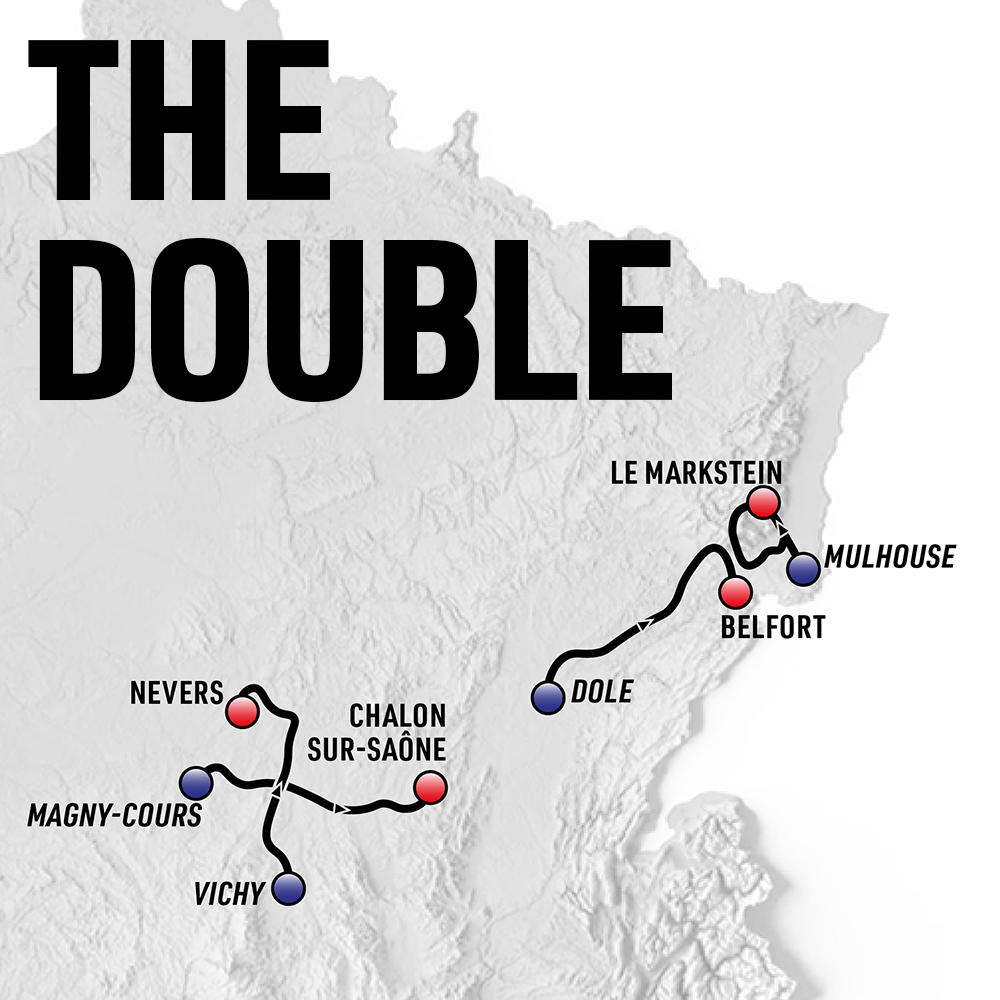The Double: 2 days cycling. 361km, 3,200m ascent
Flat (ish) perfect roads and spectacular scenery from volcanoes to vines. Add on the Vosges if you dare …
The Double Double: 4 days cycling. 728km, 9,500m ascent
Keep spinning onwards and very much upwards with two glorious days in the Vosges and two big name climbs
Two stages or Four stages; your choice…
Stages 11 and 12 are a perfect combo of very French feeling stages without any major hills (and a brilliant warm-up if you’d like more)
Stages 13 and 14 are the most magnificent Vosges stages which increase each day in difficulty – we wanted to offer an option to add them on!
So here you are; the choice between “The Double” or “The Double Double”!
The Double; what an opportunity to ride smooth French tarmac, inspired by the “road closed next week” signs which are a constant reminder that you really are riding the Tour. It’s a big challenge but these stages are beautiful cycling and we promise you’ll love it.
The Double Double; a real journey through France, culminating in some of the best riding possible that you might not discover on your own. The Vosges are a treat and in this 4 stage option, your challenge increases day by day to give the biggest sense of achievement by the time you reach the Markstein.
Itinerary
The Double:
Tues 7th July – Travel under own arrangements to our Vichy hotel by 7pm.
Note – a transfer is included from Lyon airport or Lyon St Expury TGV station to our hotel in Vichy. For more information, see the Travel Advice page.
Meet the team, meet your fellow cyclists, arrival briefing and dinner
Wed 8th – Thur 9th July – Cycle stages 11 & 12
Fri 10th July – Depart after breakfast, under own arrangements from our Chalon-sur-Saône hotel.
OR
The Double Double:
Tues 7th July– Travel under own arrangements to our Vichy hotel by 7pm.
Note – a transfer is included from Lyon airport or Lyon St Expury TGV station to our hotel in Vichy. For more information, see the Travel Advice page
Meet the team, meet your fellow cyclists, arrival briefing and dinner
Wed 8th – Sat 11th – Cycle stages 11 -14
Sun 12th July – Depart after breakfast, under own arrangements from our Belfort hotel.
Stage 11: Vichy – Nevers. 161km / 1,400m. Wed 8th July
Vichy, probably best known to anglophones as the headquarters of occupied France from 1940-1944 is a UNESCO world heritage spa town which sits right in the centre of France. It’s also known to all French children because of the mint flavoured sweets that are made with the spa water (a French polo!).
As we leave town we track the Allier valley with quiet roads, excellent birdlife (the residents of this region’s plentiful meadows) and we gaze up into the surrounding volcanic hills without having to climb them!
This is a flat stage (in Tour terms!) which celebrates one of the best parts of riding the Tour by taking us from one distinct region of France into the very different looking Burgundy region. Volcanoes to vines in 100 miles!
Rolling along under big skies, past fields of wheat and barley, we have plenty of time to chat, enjoy some really excellent, smooth tarmac and appreciate the effort involved in decorating the many villages we pass through today. Eventually we cross both the Loire river and Nivernais canal at Decize. This is a historic town on France’s longest river that has sat at a pivotal crossing point of the Loire for over two millenia.
From here we’re into the Burgundy region, most famous for its superb wines, so expect plenty of vineyard views, though there are also fields and forests to enjoy. There are a few small climbs in the final kilometres, as we move into the low range of hills that flanks Nevers to the east, but nothing that will take any enjoyment out of the challenge. It may actually enhance it?!
Tour logisitics
Start: Vichy hotel
Finish: Nevers hotel
Stage 12: Circuit Magny-Cours – Chalon-sur-Saône. 181km / 1,800m ascent. Thu 9th July
An indulgent tour of some of France’s finest countryside, this stage showcases the magnificent Burgundy region, famous for its enormous cattle and Romanesque architecture, as well as its wine.
We start by waving at the famous Magny-Cours racing circuit (nothing like a nod to a different sport to add to the fun), then follow the Loire Valley through scenery that looks (if such a thing exists) typically “Tour”; long avenues of poplar trees, church spires on the horizon, fields of rippling grains, and handsome Charolais cows provide just some of today’s photo opportunities.
Leaving the Loire river near the medieval town of Bourbon-Lancy, we cross the lower section of the Morvan National Park, on gently undulating roads that give us views out across the patchwork fields and towards the distant horizon. Whilst overall stage 12 doesn’t involve an unpleasant amount of climbing, it gets bumpier as it goes and by this point after lunch, we have a few climbs that involve 200 to 300 metres of ascent at a time.
The landscape tightens and we move into the Saône valley, with today’s most significant climb, the Côte de Montagny-lès-Buxy, providing a challenge that is more than compensated for by the exceptional views from the top, out over the vineyards of southern Burgundy and, if we’re lucky, all the way to the Swiss mountains. Our final descent towards Chalon-sur-Saône takes us into a paradise of rolling vineyards and stately chateaux.
Tour logisitics
Start: Nevers hotel
Finish: Chalon-sur-Saône hotel
And if you’re going for the Double Double, you’ll also ride …
Stage 13. Dole – Belfort. 205km / 2,500m ascent. Fri 10th July
This is the longest stage of the 2026 Tour, and links two of the five French mountain ranges, starting in the shadow of the Jura, and finishing in the Vosges. It’s very much a day of two halves, with almost all of the climbing happening in the final 50km – something worth remembering, as we charge along the gently undulating roads of Haute-Saône in the morning.
We set out from Dole, birthplace of Louis Pasteur, and for the first few hours we follow the valley of the River Doubs, rolling past wooded hills and the occasional limestone outcrop, especially as we pass the ancient fortified city of Besançon, whose towering citadel is now a UNESCO heritage site.
Although this stage is essentially flat for the first 100km, the route starts to undulate more as the shadows of the Vosges mountains begin to loom on the horizon. Passing through the historic city of Lure, and then Thibault Pinot’s home village of Mélisey (the finale of this stage is very much conceived as a Pinot tribute), we warm our legs up on the 679m Col de Croix, whose average gradient of 3.4% shouldn’t trouble us too much.
Following a brief descent into the Moselle Valley, we then pay a visit to what is arguably the Tour’s oldest col. Ballon d’Alsace was the first major mountain scaled by the race, when René Pottier beat the rest of the peloton to the summit in 1905. We’ll probably find it easier than he did, on modern groupsets and flawless tarmac, though the 6.9% average gradient (with some sections of 8%) isn’t to be taken lightly. There’s a small monument to him at the top, where we get to celebrate the last of the day’s climbing, and look forward to the long descent to Belfort.
Tour logisitics
Start: Transfer to Dole
Finish: Belfort hotel
Stage 14. Mulhouse – Le Markstein. 155km / 3,800m ascent. Sat 11th July
Today’s scenery is second-to-none, as we ride a lofty circuit of the Vosges mountains. Expect winding climbs and glorious balcony roads, with panoramic views out across the blue hilltops to the west, and over the Rhine Valley to Germany’s Black Forest to the east. We revisit the Tour’s oldest climb, as well as getting to ride one of its newest: the freshly surfaced Col du Haag.
The climbing begins about an hour into our day’s ride, after a gentle roll-out from Mulhouse, through fields and vineyards that cling to the Vosges’ lower slopes. The road up to the Grand Ballon is long, at 21.5km, but its relatively benign gradients (averaging 4.8%) will leave us some spare attention for the increasingly spectacular views, as we emerge from the trees, and up into the wide-open grasslands that crown this mountain. We keep our elevation for a while (ie. two summits for the price of one), as we follow the beautiful Route des Crêtes for our first visit to Le Markstein – where we finish our day’s ride, in just over 100km.
Descending into the next valley, we find ourselves on a winding road that takes us up to the Col du Page, flanked by mature trees and some lovely shelter from the sun. Following a brief visit to the quiet town of Saint-Maurice-sur-Moselle, a left turn takes us onto the hallowed tarmac of the Tour’s original mountain: Ballon d’Alsace. This ascent will be slightly steeper than the first two, but it’s worth saving some energy for later, because ahead of us lies one of this year’s big challenges: the Col du Haag. This brand new climb is closed to motorised vehicles, and is eye-wateringly steep, with plenty of 10% sections as we work our way up through the trees from the valley floor. We pop out on a road that feels decidedly familiar, and from here it’s a 5km victory lap along the ridgeline (ie. the work is done; the altitude is gained), back to Le Markstein.
Tour logisitics
Start: Transfer to Mulhouse
Finish: Transfer back to the Belfort hotel (2nd night in the same hotel)
| Total
Cost |
Deposit | Second Payment
Due end Jan |
Final Payment
Due end Mar |
Fundraising Target | 80% Fundraising
due end April |
|
£715 / £1200
|
£250 | £180 | £285 / £770 | £1000 / £1200 | £800 / £960 |
- Accommodation (Mostly twin share. Single supplements are subject to availability)
- All food (3 meals and the best feedstops you’ve ever seen)
- Fully signed route, the stuff of legend
- Mechanical, medical and moral support
- Luggage Transfers
- Coach transfers to the next stage start when the stages aren’t contiguous
- Travel to and from France (but we’ll give you advice on the best travel routes)
- Bike Transport (£50 each way if you want us to drive your bike there and back)
- Evening massage (£15 or €15 per massage if you’d like one – highly recommended)
- Beer/wine/drinks at dinner


